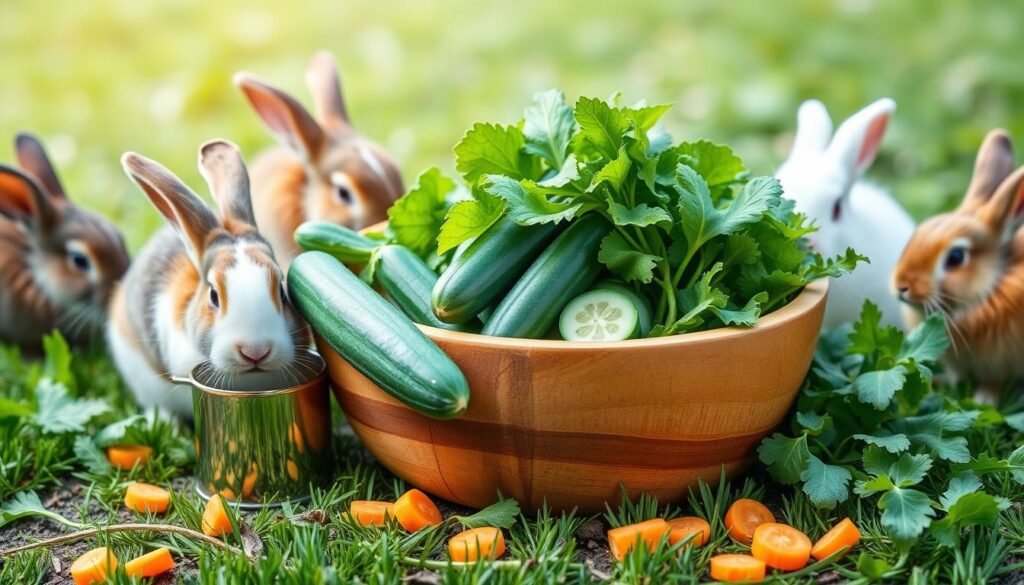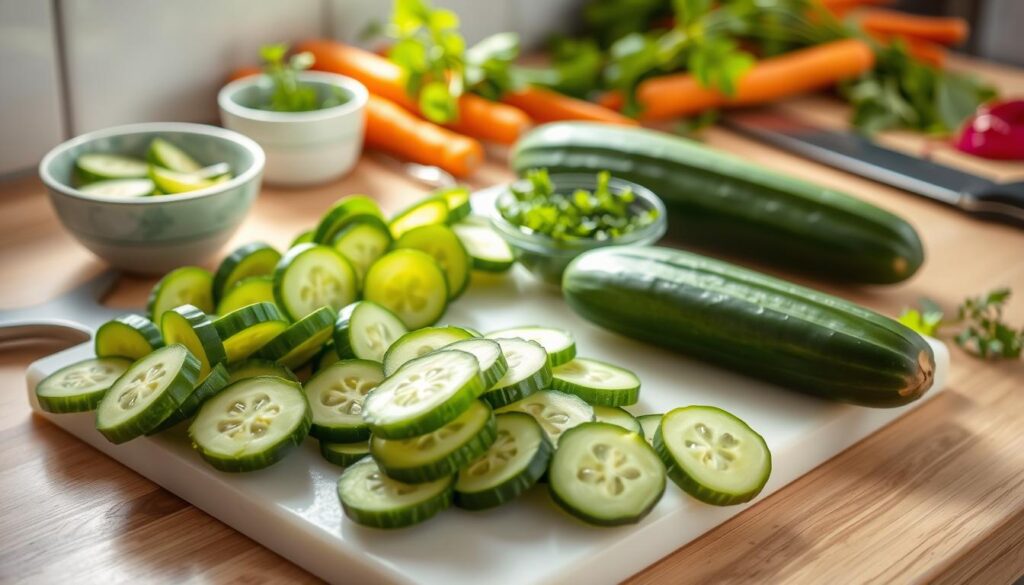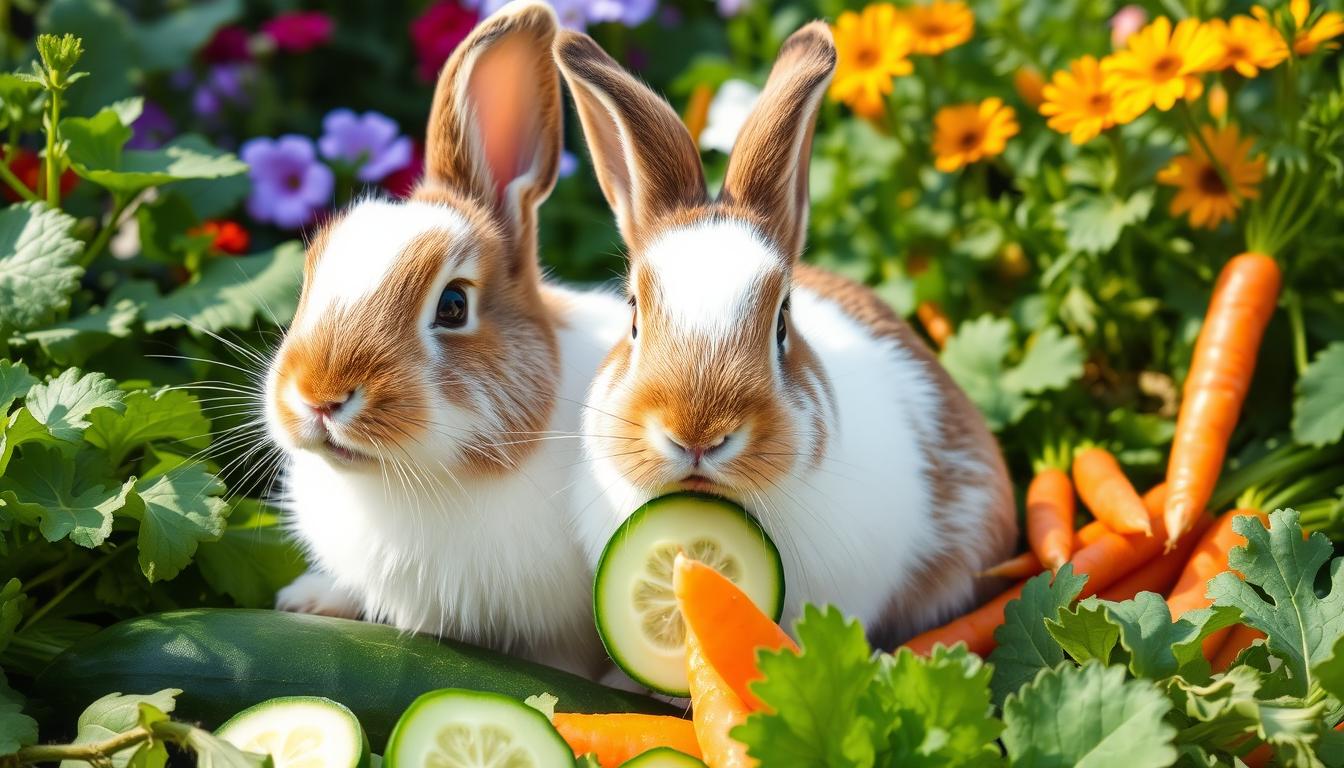Ever thought about giving your rabbit a cool cucumber snack? As a rabbit owner, you aim to give them a diet that’s both balanced and healthy. But with so much info out there, finding the right human foods for your rabbit can be tough. This guide will help you understand if cucumbers are safe and good for your rabbit, so you can feed them wisely.
Table of Contents
Understanding Rabbit Nutrition Basics
It’s key to give your rabbit a balanced diet for their health. Hay or grass should be 80-90% of their food. Fresh veggies should be 10-15%, and pellets just 5-10%.
Essential Components of a Rabbit’s Diet
Rabbits need a lot of fiber for their digestive health. Timothy or orchard grass hay is best. They also love fresh leafy greens like kale and spinach. Always make sure they have clean water to drink.
Daily Nutritional Requirements
The nutritional needs of a rabbit depend on their age, size, and health. A 6 lb rabbit needs 1.5 to 2.5 cups of veggies daily. Only give 2-5 tablespoons of pellets and treats like fruit in small amounts.
The Importance of Hay and Fresh Water
Hay is vital for a rabbit’s teeth and digestion. It helps keep their teeth trimmed and provides fiber. Always keep their water fresh and clean for their health.
“Hay should comprise 85% of an adult rabbit’s diet according to the San Diego House Rabbit Society.”
Can Rabbits Eat Cucumbers
Yes, rabbits can safely enjoy cucumbers as an occasional treat. Cucumbers are full of water, which can help keep a rabbit hydrated. But, it’s key to only give them cucumbers in small amounts to avoid stomach problems.
Rabbits can eat the flesh and leaves of cucumbers. But, cucumbers should only make up 5-10% of their diet. Vets suggest giving 1-2 small slices a few times a week. This adds variety to their diet of hay, greens, and a bit of pellets.
- Rabbits can safely eat 1–2 slices of cucumber per week.
- Cucumbers should generally make up no more than 5–10% of a rabbit’s total diet.
- Cucumbers should be offered 2–3 times a week in small portions as a treat.
- Treats, including cucumbers, should not be the staple of a rabbit’s diet.
- Cucumbers should not replace essential foods such as hay and leafy greens in a rabbit’s diet.
It’s important to introduce cucumbers slowly and watch how your rabbit reacts. Sudden diet changes can upset their stomach, causing diarrhea or a loss of appetite for hay. With careful portioning, cucumbers can be a tasty rabbit treat.
“Cucumbers are a great way to add hydration and variety to your rabbit’s diet, but they should be given in moderation as part of a balanced meal plan.”
Remember, cucumber for rabbits is a treat, not a main food. By adding cucumbers wisely, you can give your rabbit a healthy and tasty safe vegetable for rabbits to enjoy.
Nutritional Benefits of Cucumbers for Rabbits
Cucumbers are not the most nutrient-rich food, but they have some good points for rabbits. They are mostly water, which is great for keeping rabbits hydrated, especially when it’s hot. This helps prevent dehydration.
Water Content and Hydration Benefits
Cucumbers are perfect for rabbits because they are very wet. This helps keep rabbits’ fluids up and stops dehydration. The skin of cucumbers also has fiber, which helps with digestion.
Vitamins and Minerals in Cucumbers
Cucumbers also have vitamins and minerals that are good for rabbits. They have vitamin A, vitamin C, potassium, and lignans. But, cucumbers should not be the main food for rabbits.
“Cucumbers are a great way to add variety and hydration to your rabbit’s diet, but they shouldn’t make up more than 5% of their total food intake.”
Remember, cucumbers are good but should be eaten in small amounts. Eating too much can cause stomach problems like loose stools. Always introduce new foods slowly and watch how your rabbit reacts.
Safe Feeding Guidelines and Portions
Feeding cucumbers to your rabbit needs care and moderation. Give them small amounts, like a few pieces at a time. Start with small amounts to prevent digestive problems.
Cucumbers should be a small part of their diet, about 10-15%. Too much can cause stomach issues. Always wash cucumbers well and remove seeds before giving them to your rabbit.
Choose organic cucumbers to keep your rabbit safe from pesticides. A good rabbit diet includes high-quality hay, a bit of pellets, and safe veggies like cucumbers, celery, and leafy greens.
“Cucumbers are a refreshing and hydrating treat for rabbits, but they should be fed in moderation as part of a well-rounded diet.”
Following these guidelines helps your rabbit enjoy cucumbers safely. Always introduce new foods slowly and watch how your rabbit reacts.

Potential Risks and Side Effects
Cucumbers can be a tasty and refreshing snack for rabbits. But, it’s important to watch out for the risks and side effects of eating too much. Rabbit digestive health is very sensitive, and new foods should be introduced carefully.
Digestive Issues to Watch For
Eating too many cucumbers can cause GI problems in rabbits. This includes diarrhea and loose cecotropes. Cecotropes are vital for rabbits, providing nutrients like vitamin B.
Not having enough cecotropes can lead to malnutrition and health issues.
Signs of Cucumber Intolerance
Some rabbits might show signs of not tolerating cucumbers well. These signs include gas, diarrhea, or changes in how they eat. If you see these symptoms, stop giving cucumbers and talk to your vet.
Keeping your rabbit safe from food-related problems is key.
| Potential Risks | Symptoms | Recommended Action |
|---|---|---|
| Digestive Issues | Diarrhea, Loose Cecotropes | Discontinue feeding cucumbers, consult a veterinarian |
| Cucumber Intolerance | Gas, Diarrhea, Changes in Eating Habits | Discontinue feeding cucumbers, consult a veterinarian |
Watching how your rabbit reacts to new foods like cucumbers is crucial. By being aware of the risks and side effects, you can keep your rabbit healthy and safe. This way, you ensure they get a balanced and nutritious diet.
How to Prepare Cucumbers for Your Rabbit
Adding cucumbers to your rabbit’s diet needs careful preparation for safety and health. Cucumbers can be a cool and hydrating treat for your pet. But, they need some easy steps to be ready for your rabbit.
Start by washing the cucumbers in cold water to get rid of any bad stuff. Choose organic cucumbers for the cleanest option. After washing, cut the cucumber into small pieces to avoid choking. Make sure to take out the seeds, as they can be a choking hazard.
The cucumber skin is okay to leave on because it’s good for your rabbit’s digestion. But watch how your rabbit reacts to it. Some might not like it.
When introducing new foods like cucumbers, do it slowly and in small amounts. This helps you see how your rabbit reacts. It’s important to watch for any signs of trouble, like tummy issues or intolerance. Slowly adding new foods keeps your rabbit healthy.

By following these steps, you can safely add cucumbers to your rabbit’s diet. They’re a great, healthy snack. Just remember, don’t overdo it. Always talk to your vet for the best diet advice.
Best Practices for Introducing New Foods
When adding new foods to your rabbit’s diet, do it slowly and carefully. Start with small amounts of the new food. Watch your rabbit closely for 24 hours to see how they react.
Look for any changes in their appetite, behavior, or bowel movements. These could mean they have a problem digesting the new food.
Monitoring Your Rabbit’s Response
If your rabbit seems fine after the first try, you can slowly add more of the new food. Watch how they eat, their energy, and their droppings. This helps make sure they can handle the new food.
Signs of Food Acceptance
- Normal eating and drinking habits
- Regular, healthy bowel movements
- Maintained energy and activity levels
If your rabbit’s appetite drops, they have loose stools, or seem tired, stop the new food right away. Talk to your vet. Being patient and watching closely is important when introducing new foods for rabbits. It helps with smooth rabbit diet changes and rabbit food introduction.
“Gradual introduction of new foods is critical to maintaining a healthy rabbit diet and avoiding digestive issues.”
Combining Cucumbers with Other Safe Vegetables
Creating a varied diet for your rabbit is easy with cucumbers and other safe veggies. Leafy greens like spinach, kale, and romaine lettuce are great. They add essential vitamins and minerals. Herbs like parsley, cilantro, and mint also add flavor and variety.
Bell peppers, carrots (in small amounts), and celery are also safe choices. It’s important to offer a variety of fresh produce. This ensures your rabbit gets all the nutrients they need. Always introduce new veggies one at a time to watch for any bad reactions.
A good rabbit diet is 85% hay, 10% leafy greens, and 5% quality pellets. Mixing cucumbers with other safe rabbit vegetables helps keep your rabbit healthy. A balanced rabbit diet is key for their long-term health.
“Variety is the spice of life, even for our rabbit companions. By offering a diverse selection of safe vegetables, we can ensure our rabbits receive a comprehensive range of nutrients to thrive.”
Start with small amounts of new foods and watch your rabbit’s reaction. Gradually add more as they get used to it. This helps avoid stomach problems and makes the transition smooth.
Seasonal Feeding Considerations
As the seasons change, it’s key to adjust your rabbit’s diet. Cucumbers are great in summer because they help keep your rabbit hydrated.
In summer, you can give more cucumbers to help with hydration. But, remember to keep the diet balanced. Include hay, fresh veggies, and a bit of pellets.
In winter, focus on hay and warm veggies like root veggies. This helps keep your rabbit warm. Always make sure they have fresh, clean water, no matter the season.
Watch how active your rabbit is and their health. Their diet might need to change with the seasons. This ensures they get the nutrients they need all year.
- Increase cucumber portions slightly
- Provide water-rich greens like romaine lettuce
- Monitor for signs of heat stress
- Emphasize hay and root vegetables
- Include small amounts of nuts and seeds
- Ensure constant access to fresh water
| Season | Feeding Focus | Tips |
|---|---|---|
| Summer | Hydration | |
| Winter | Warmth and Energy |
Understanding your rabbit’s seasonal needs helps keep them healthy all year. Adjust their diet to meet these needs for their best health.
Conclusion
Cucumbers can be a safe and hydrating treat for your rabbit when given in small amounts. They should be part of a balanced diet that mainly includes hay. Vegetables should make up 10-15% of your rabbit’s daily food.
When introducing new foods, do it slowly and watch for any bad reactions. If you’re worried, always talk to a vet.
While cucumbers are good for hydration, they shouldn’t replace hay and leafy greens in your rabbit’s diet. A rabbit diet summary should include a variety of foods. This ensures your rabbit gets all the nutrients they need.
Occasionally, giving your rabbit cucumber feeding guidelines can be a nice, low-calorie snack. By following these healthy rabbit care tips, you can help your rabbit stay happy and healthy for a long time.
The secret to a happy rabbit is a balanced diet, lots of fresh water, and a safe place to live. Keep an eye on things, talk to your vet, and watch your rabbit grow and thrive.

